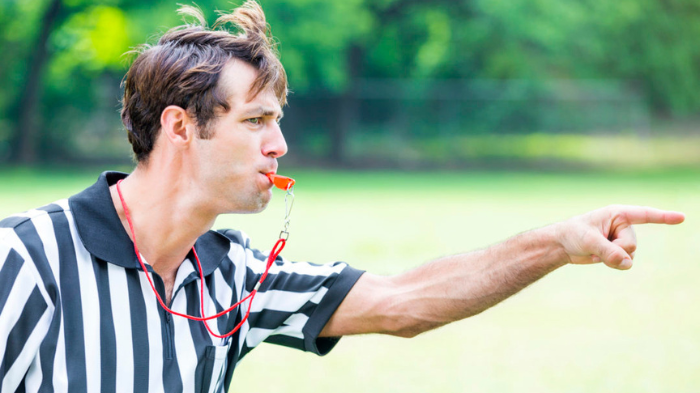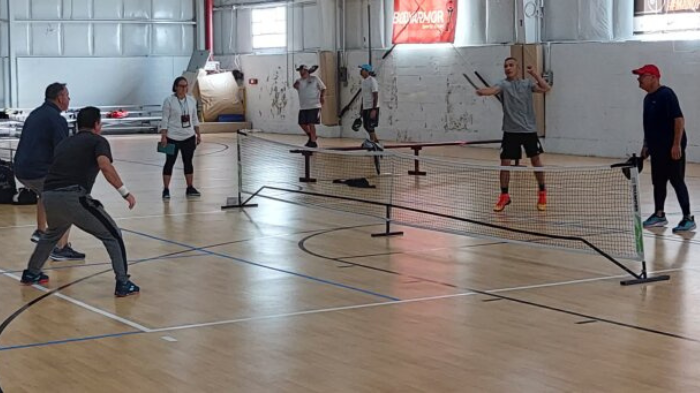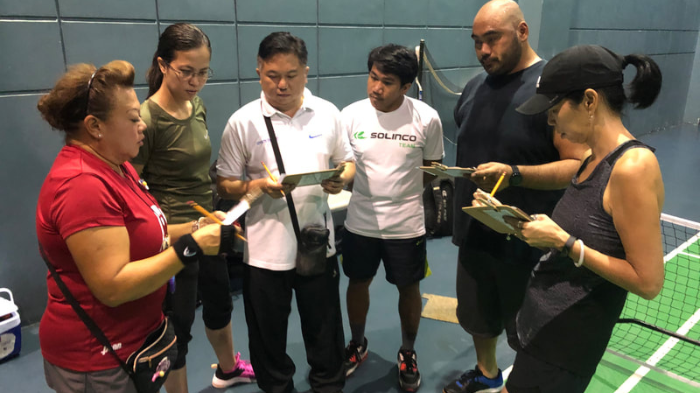Are you interested to become a pickleball referee? If yes, then this pickleball referee guide is for you. Today, We are going to discuss how you can become a pickleball referee. Along with the steps for becoming a pickleball referee, we are also going to explain the role of a pickleball referee, the benefits of becoming a pickleball referee, and pickleball referee levels.
Read this blog, start preparing for the post of pickleball referee according to the steps described below, and become a proficient pickleball referee and also know about what is volley in pickleball? And how to become a 4.0 pickleball player?
What Is the Role of Referee in Pickleball?
In pickleball, the pickleball referee’s role is essential as they are responsible for ensuring that the game is played in a fair and rule-compliant manner. The pickleball referee has various responsibilities, such as making calls, monitoring the score, and resolving any conflicts during the game. By enforcing the rules impartially and making fair calls, the referee fosters sportsmanship and fairness, resulting in a pleasant experience for all players involved.

Here are some of the specific duties of the referee in pickleball:
- Starting The Game: Before the game begins, the referee will call the players to the court and explain the rules and any special conditions for the match, such as the time limit or scoring system. The referee will also flip a coin or use another method to determine which team will serve first.
- Calling The Score: During the game, the referee will call out the score after each point is scored. The score in pickleball is always called out with the serving team’s score first, followed by the receiving team’s score.
- Making Calls: The referee is responsible for making calls during the game, such as calling faults, lets, and out-of-bounds shots. The referee will also make calls if there is a dispute between the players over a particular shot or point.
- Enforcing The Rules: The role of the referee is to ensure that the players follow the rules of the game. If a player violates a rule, like stepping into the non-volley zone while volleying, the referee must call a fault. The opposing team is awarded a point when the referee calls a fault.
- Resolving Disputes: During a game, if there is a disagreement between players about a shot or call, the pickleball referee serves as an impartial mediator. The referee listens to both sides of the argument before making a decision based on the game’s rules.
- Ending The Game: The referee will proclaim the final score and declare the winner of the competition when the game is over.
Which Are the Pickleball Referee Levels?
The International Federation of Pickleball (IFP) generally oversees the certification of pickleball referees worldwide. The IFP has developed a system of levels that referees can progress through based on their demonstrated proficiency, experience, and ability to make unbiased and dependable calls. This system is designed to assist referees in enhancing their skills and validating their comprehension of the rules. Here are some of the key details about each pickleball referee level:
Newcomer: For those who want to become a pickleball referee, the initial step is to take the “Introduction to Pickleball Officiating” online course offered by the IFP. This course covers the fundamental aspects of the game and the duties of the referee, serving as a starting point for anyone who wishes to pursue certification. Through this course, newcomers can familiarize themselves with the process of becoming a certified referee and acquire the necessary knowledge and skills.
Level 1 Referee: Upon completing the online course, individuals can progress to the Level 1 Referee certification. This level necessitates an on-court assessment in which the candidate must exhibit their proficiency in making precise calls and communicating efficiently with players. Level 1 referees are qualified to officiate at local and regional tournaments.
Level 2 Referee: For referees who have gained some experience and aspire to enhance their skills, Level 2 is the next progression. This certification level entails more thorough on-court assessments and further training in fields like game management, scorekeeping, and conflict resolution. Referees who have achieved Level 2 certification are permitted to officiate in regional and national tournaments.
Certified Referee: The highest level of certification available through the IFP is the Certified Referee level, which is the most advanced level a referee can achieve. To acquire this certification, a Level 2 Referee needs to amass a specific level of expertise and clear a final on-court evaluation. Certified referees have permission to officiate at all levels of play, comprising worldwide competitions.
Why do You need to Become Pickleball Referee?
Becoming a pickleball referee can offer numerous benefits and opportunities for individuals who are passionate about the sport and want to contribute to its growth and success. Here are some of the reasons why you should consider becoming a pickleball referee:
- Enhance Your Knowledge Of The Game: Becoming a pickleball referee can provide you with a thorough understanding of the sport’s rules, regulations, and subtleties. This knowledge can improve your abilities as a referee and benefit your playing skills by giving you a deeper understanding and appreciation of the game’s complexities.
- Contribute To The Sport: Becoming a pickleball referee is valuable to the sport’s growth and development. Referees play a critical role in promoting safe and fair play by ensuring that the rules are followed. Creating a positive experience for both players and spectators through fair and safe play can encourage more people to participate in the sport.
- Opportunities For Travel And Networking: Refereeing at tournaments and competitions can provide exciting opportunities to travel to new places and meet fellow pickleball enthusiasts. It can help you build your network within the pickleball community and create lasting friendships.

- Personal And Professional Growth: Being a referee requires strong decision-making skills, staying calm under pressure, and effective communication skills. These are valuable skills that can benefit you both personally and professionally.
- Volunteer Experience: Refereeing can be a satisfying volunteer experience in addition to the personal benefits and the promotion of the sport. It is a chance to show support for a beloved sport and contribute to the community.
Steps for Becoming a Pickleball Referee
Pickleball is an entertaining sport that combines elements of tennis, badminton, and ping pong. The sport’s rising popularity has led to a need for proficient referees. Obtaining certification as a pickleball referee requires a profound comprehension of the game, previous practical experience playing it, and undergoing adequate training. Developing these skills will enable you to ensure that all matches are conducted in adherence to the rules and regulations. Here are the steps you can take to become a pickleball referee:
Understand The Rules:
The first step to becoming a certified pickleball referee is to understand the rules of the game. You can read the official rules on the USA Pickleball Association (USAPA) website or attend a pickleball clinic where certified instructors teach the rules. Make sure you are familiar with all the rules and regulations of the game, including scoring, court dimensions, pickleball spin serve rules, and faults.
Gain Experience:
Prospective referees who want to obtain certification in pickleball must have experience playing the game. They can begin their journey towards certification by joining local pickleball leagues, clubs, or tournaments, which offer an excellent opportunity to gain practical experience through match participation. Through participation in matches, they can develop a comprehensive understanding of the game’s rules and mechanics, a requirement for becoming a certified pickleball referee.
Attend A Pickleball Referee Training Clinic:
Once you have a good understanding of the rules and some experience playing the game, it is time to attend a referee training clinic. The USAPA offers pickleball referee training clinics throughout the year, where you will learn about the rules, mechanics, and procedures of officiating pickleball matches. Experienced referees typically lead the clinics, including classroom instruction and on-court practice.

Pass The Certification Exam:
After attending a pickleball referee training clinic, you will need to pass a certification exam to become a certified pickleball referee. The exam consists of 100 multiple-choice questions and covers all aspects of the rules and regulations of the game. You must score at least 80% to pass the exam and become certified.
Gain Experience As A Referee:
Once you are certified, you can start gaining experience as a pickleball referee. You can begin by refereeing matches at local tournaments, leagues, or clubs. As you accumulate more experience, you can progress to umpiring matches at higher levels of competition, such as state or national tournaments.
Attend Advanced Training:
Attending advanced training clinics and seminars is crucial for improving as a pickleball referee. By participating in these training sessions, you can keep yourself informed about the latest rule modifications, techniques, and strategies that can help you officiate matches more effectively.
Renew Your Certification:
Your pickleball referee certification is valid for three years. To maintain your certification, you must renew it every three years by completing a recertification exam and attending a pickleball referee training clinic. By doing so, you can stay up-to-date with the most recent rules and regulations of the sport and keep refining your abilities as a referee.
Frequently Asked Questions
To be certified as a pickleball referee, it is necessary to possess a strong grasp of the sport, have some experience playing it, and successfully complete a pickleball referee training course.
Participating in local pickleball leagues, clubs, or tournaments is an excellent way to gain hands-on experience. By playing in matches, you can hone your skills and knowledge of the sport, which is crucial in becoming a certified pickleball referee.
You can contact your local pickleball association or governing body to inquire about the availability of pickleball referee training courses. Online courses are available for those who are interested in becoming a certified pickleball referee, making them easily accessible to anyone who wants to participate.
The duration required to become a certified pickleball referee can vary, but it usually takes a few months to fulfill all the required training and certification criteria.
By earning your pickleball referee certification, you may participate actively in the sport and improve your knowledge of it. As the sport of pickleball continues to gain popularity, the demand for skilled and certified referees is increasing.
Conclusion
By obtaining a certification as a pickleball referee, you can deepen your understanding of the sport and play a more active role in its development. The growing popularity of pickleball means that there is a greater need for qualified referees to ensure that matches are officiated properly. In this blog, we have discussed how you can become a pickleball referee through various stages, from understanding the pickleball game’s rules to the renewal of certification as a pickleball referee.
Additionally, we have discussed the role of a referee in pickleball, advantages of becoming a pickleball referee, and pickleball referee levels. If you love the game and want to be a part of its growth, becoming a certified pickleball referee could be a rewarding option for you to explore. After writing this blog, we hope you have understood the pickleball referee’s role with its benefits and are following the steps mentioned above to become a pickleball referee.



